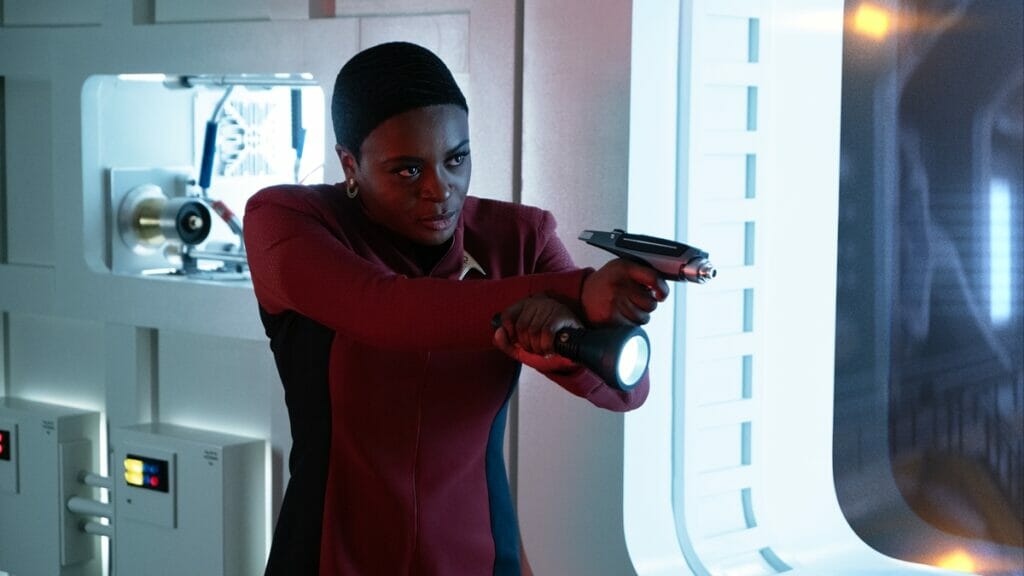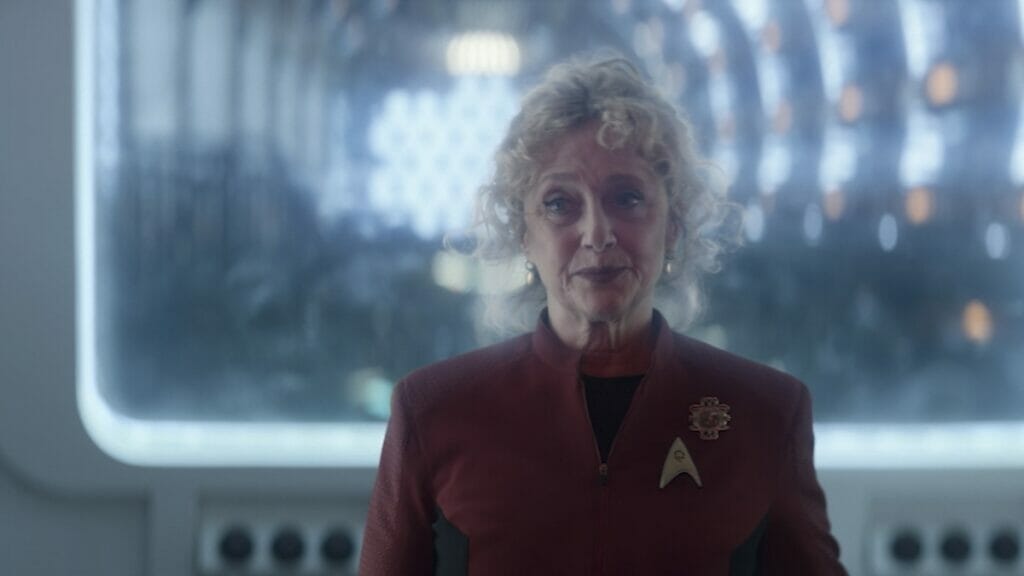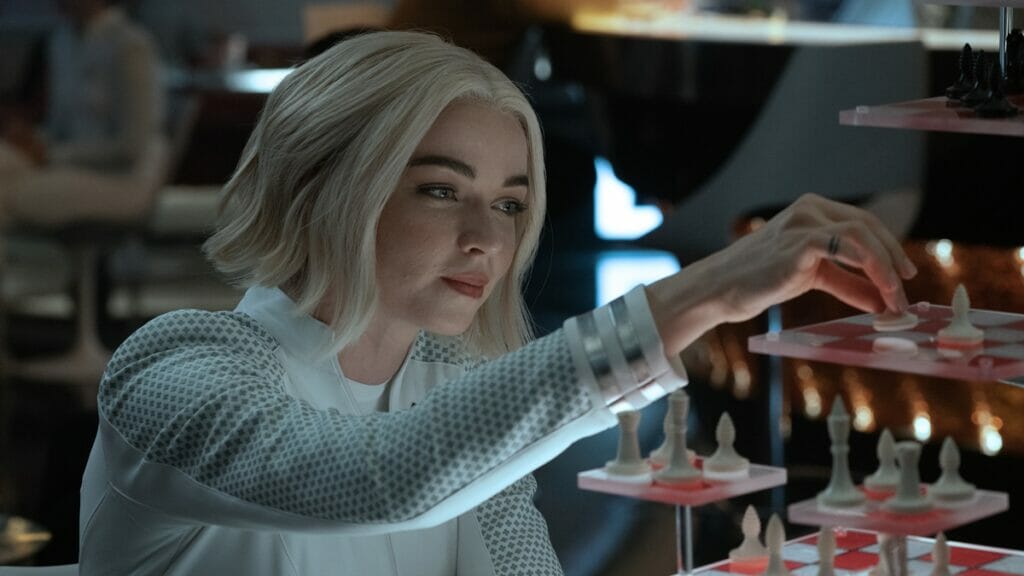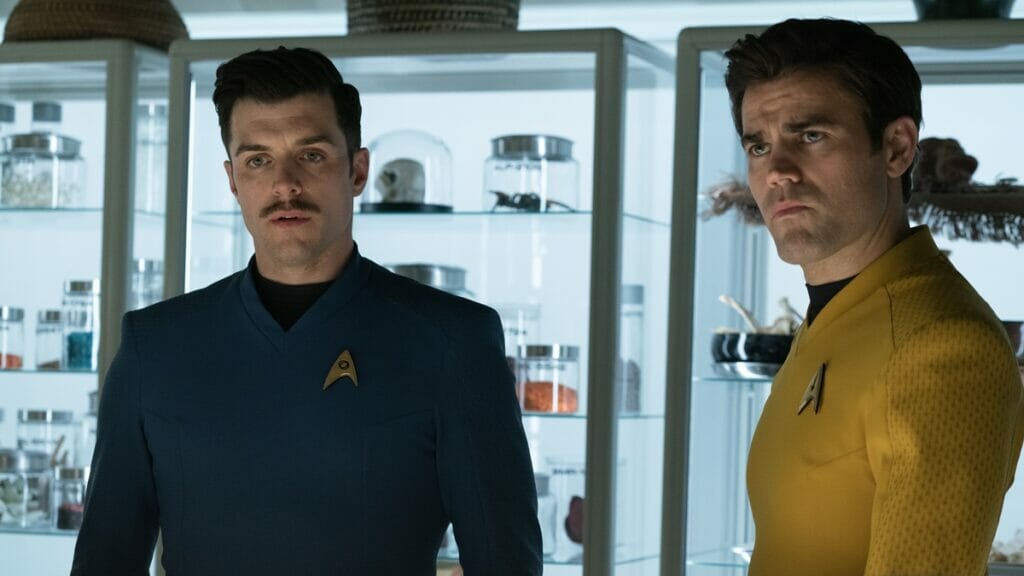Read also:
How to Watch FX Live Without CableHow To Watch AMC Without CableHow to Watch ABC Without CableHow to Watch Paramount Network Without CableA high concept sci-fi phenomena helps Ensign Uhura make peace with the deep losses she faced before and after joining Starfleet.
Grief is a pickpocket. It can steal the fond memories of those we love and turn them into painful reminders of what we’ve lost. Ensign Uhura (Celia Rose Gooding) still struggles with that sense of loss. She lost her family in a shuttle accident that defined the start of her Starfleet career in tones of tragedy. She formed a prickly but heartfelt bond with Lt. Hemmer (Bruce Horak), only to watch him give his life to save the rest of the crew in another tragic event. The pain of yet another bond broken still rumbles within Nyota, robbing her of sleep and prompting her to bury that need to mourn in a mountain of work and a happy facade.
So when she starts hallucinating some disturbing images — of Hemmer returning in a grisly zombified form, of a corridor full of murdered colleagues, of her fellow bridge officers sucked into the vacuum of space — it’s easy to process it all as a manifestation of her unresolved grief. Uhura has seen people she loves taken from her. She’s overworked. She’s under-slept. She’s been exposed to the usual variety of weird radiation. There’s surely a normal, everyday explanation behind these extraordinary and frightening visions.
 Paramount+)" class="wp-image-43215"/>
Paramount+)" class="wp-image-43215"/>Except, of course, this is Star Trek. So they’re not the simple result of a harried ensign overdoing it at an emotionally fraught time. They are, instead, the result of the strange sci-fi phenomena of the week, making itself known in a way that just so happens to coincide with an important emotional breakthrough for one of the show’s main characters.
That’s not a knock. “Lost in Translation” plays the “Is this just a stress hallucination or a sci-fi disturbance?” game well. Savvy fans can probably guess that it’ll turn out to be some weird consequence of the peculiar nebula the USS Enterprise happens to be drifting through this week. But that doesn’t weaken how Strange New Worlds uses those developments for some commendable character for Uhura.
“Lost in Translation” plays the “Is this just a stress hallucination or a sci-fi disturbance?” game well.
The writers do a superb job of steadily unspooling the mystery. When more crewmembers start acting erratically, with one even sabotaging the nearby refinery, it quickly becomes apparent that this is not simply a Nyota problem. The mania and eventual death of that poor beleaguered officer, who’s farther along in his mental degradation than Uhura, establishes not just the instant stakes for Nyota but adds to her psychological tumult from worrying that she’ll share his fate if she’s not able to figure this out. And the wider-ranging concerns mean the whole cast can be enlisted to stop this immediate threat and figure out the broader problem.
Thankfully, they have an ally — one Lt. James T. Kirk (Paul Wesley), the new first officer of the USS Farragut. This is Kirk’s third appearance on Strange New Worlds among only sixteen total episodes. But it’s his first in the “real” timeline. (His prior appearances were alternate-history switcheroos where his existence was effectively wiped away afterward.)
On the one hand, Kirk’s presence is a welcome one. While Paul Wesley doesn’t necessarily scan as the same character who stepped onto the bridge in 1966, his version of the once-and-future captain feels fully realized at this point. He comes with a shaggy confidence, alongside subtle gestures toward feet of clay, that make him a compelling figure in SNW’s milieu, and Gooding and Wesley mesh well together on screen.
 Paramount+)" class="wp-image-43217"/>
Paramount+)" class="wp-image-43217"/>More to the point, using none other than the eventual Captain Kirk to represent the idea that “the job” in Starfleet inevitably comes with a certain amount of death, something that must be confronted rather than ignored, comes with a certain resonance given the character’s known future. It’s the kind of blend of writing and performance that Strange New Worlds would be empty without and a good reminder of why the members of the WGA and SAG deserve a fair deal from the studios who need their talents to produce shows like this one.
Granted, in a show that already comes with six legacy characters in its main cast, two of whom are icons from The Original Series, and several more among its recurring players, it’s worth asking why Strange New Worlds feels the need to keep going back to the Kirk well. There’s so much green space to explore in the Star Trek universe. There are millions of people on millions of worlds out there. Why do we need to return to the same famous faces?
Fanservice notwithstanding, in true Strange New Worlds fashion, the episode doesn’t merely bring back Kirk for a cheap pop. (Though it does include a cheesy “Kirk meets Spock” moment.) Instead, the episode uses his presence to spur Uhura’s journey and, not for nothing, develop him in ways even the 1960s series didn’t quite manage. “Lost in Translation” delves into Jim’s frosty relationship with his brother, Sam. Their attachment is strained by a competitive need to live up to their famous father’s legacy (replete with a USS Kelvin mention) and the fact that they each took different paths in life.
 Paramount+)" class="wp-image-43213"/>
Paramount+)" class="wp-image-43213"/>Moreover, an encounter between Kirk and La’an brings a particularly charged atmosphere after the events of “Tomorrow and Tomorrow and Tomorrow.” But it also accounts for Kirk’s altruism. He explains to La’an that his father neglected him to help others. His father’s absence made him internalize the idea that helping others across the galaxy must be an important cause if it’s worth leaving your son behind for it. It’s a sad and sweet explanation for Kirk’s do-gooder spirit, one given extra force by La’an’s reassurance as a beneficiary of such kindness, and it justifies Kirk’s inclusion beyond mere fan recognition.
Apart from the arrival of arguably the franchise’s most famous future captain, “Lost in Translation” includes other little vignettes along similar lines. Jim and Sam have an awkward drink together at the bar. Spock (Ethan Peck) and Nurse Chapel (Jess Bush) have a charged conversation about their relationship’s superpositional state over a three-dimensional chess game. Number One (Rebecca Romijn) and Pelia (Carol Kane) spar over procedure, chain of command, and who has crumbs on whose uniform.
The nightmare becomes catharsis, a reminder that the good isn’t gone just because those we shared it with might be.
Most of these conversations tie into the episode’s main narrative or themes in some way, however tangential. But it’s also just nice to see these characters having lives and conflicts outside of the crisis of the week. That approach was a hallmark of The Next Generation and its ilk, to significant effect. Those little glimpses into people’s regular lives make these uber-talented spacemen more relatable and endearing to us mere earthbound mortals.
Still, the conflict between Una and Pelia ties into the episode’s themes more directly. The doctrinaire Number One’s barely-restrained disdain for the more freewheeling Pelia does not, in fact, stem from their different work styles. Nor is it a byproduct of Pelia giving Una a barely-passing grade back at the Academy. It is, instead, because Pelia is Hemmer’s replacement, and accepting her means accepting that her friend is gone and someone else is in his place. Confrontation and acknowledging that hardship helps both these seasoned officers push through it.
The same type of issue is affecting Uhura. Her hallucinations turn out to be caused by extra-dimensional life forms who live in the local nebulas. Her visions are a product of them trying to communicate with her — each scary nightmare reflecting their sense of being trapped or attacked or losing some of their own people. But genuinely connecting with them, understanding what they’re feeling and what they need, requires Uhura to confront the feelings she’s been compartmentalizing for so long, lest they continue to cause her such great pain.
 Paramount+)" class="wp-image-43216"/>
Paramount+)" class="wp-image-43216"/>And yet, she does. With the support of Kirk and Captain Pike (Anson Mount), she too faces down those losses that have lingered with her for all this time. A common language of grief connects her with these unfathomable life forms, ultimately allowing her to save them. She stands firm in their defense, imploring the captain to destroy the refinery that’s killing them, which the equally compassionate and trusting current captain of the Enterprise does.
And in the wake of that choice, the once haunting image of a desiccated Hemmer, looming like a specter of death and loss, turns into a smiling friend waving goodbye to someone he loves. The nightmare becomes catharsis, a reminder that the good isn’t gone just because those we shared it with might be.
The Uhura, who lands on the other side of this experience, has still been through a lot. You cannot erase the loss of a parent, a sibling, or a friend. But there is something true to the ethos of Star Trek that is embracing those difficult feelings, and accepting them as hard but noble truths, can not only help us to make peace with our losses and recover what we loved about those who are gone but also help others when they need it too.